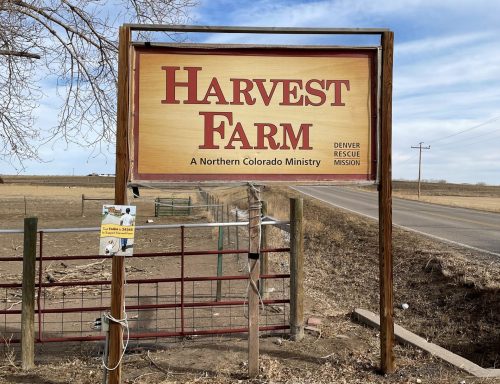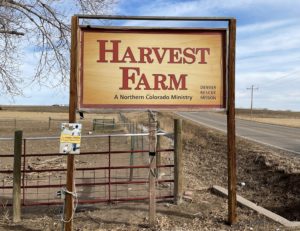
Medical Students Partner with Harvest Farm Rehabilitation Facility
Harvest Farm is a 100-acre rehabilitation farm in Wellington, Colorado ran by the Fort Collins division of the Denver Rescue Mission. The farm is a Christian sober-living community whose mission is to change lives and provide resources to maintain sobriety for men who suffer from addiction and homelessness.
The New Life program provides guidance, necessities, therapy, and training to seventy-two accepted residents. The values and skills they acquire facilitate remission of addiction and successful reintegration into the collective community.
Residents usually spend a year living on the farm where their classes and therapy integrate the self-sustaining farm. Daily tasks and assignments surround care of agriculture and animals. The responsibility to tend to their crops and care for their animal counterparts foster values of discipline, commitment, and teamwork. The men have a reciprocal relationship with the environment: they maintain healthy agriculture and in turn promote their own healthy diet. Human-animal relationships create non-judgmental connection and reinforcement of essential traits needed to maintain sobriety and a steady occupation.
The seclusion of Harvest Farm creates solitude for deep reflection, gratitude, and a sense of purpose for many. Addiction frequently co-exists with trauma and adverse life experiences. Processing these events requires space, effort, and support. The isolation of the farm in its natural habitat with community creates a therapeutic and enriching experience.
Benefits provided to the occupants are frequently extended to the broader community. Many crops and animal products provide food for homeless shelters and others who need assistance. The symbiotic relationship among the members of this ecosystem motivates Denver Rescue mission in their work to bring together human health, environmental sustainability, and animal well-being.
Harvest Farm and CU/CSU Medical Students
Medical students involved in the CU/CSU partnership of the CU School of Medicine participate in community outreach to supplement this ecosystem. We partner with Harvest Farm to learn about addiction, recovery, and the needs of this community. We use our tenure with the farm to identify health needs, add resources, and promote well-being.
We have engaged with the community by working with the men in the kitchen and agriculture groups and initiated projects based off our conversations with the residents. We have provided health literacy education about physiologic processes of addiction and recovery. We organized COVID screenings and vaccine clinics to minimize outbreaks and promote primary prevention of disease. We have initiated conversations and education between Harvest Farm and resources in the community to offer targeted medical care for men in recovery.
Working side by side with the individuals in the kitchen and agriculture teams at Harvest Farm has granted us the privilege to learn their stories and ways to better care for our future patients. Our experience of One Health in this setting translates to our patient care of those suffering from addiction, psychiatric disorders, homelessness, and terminal illness.
The different facets of the One Health concept could meet the emotional and spiritual needs of our community that are sometimes overlooked. If we were to fulfill these needs, it could lead to better quality of life, adherence to treatment, and lower morbidity and mortality.
Future investigation should be conducted to further determine One Health’s effects on patients with mental and terminal illness. The discussion of this approach could inspire new programs and treatments.
ABOUT THE AUTHORS
Amelia R. Barber | Medical Student, Class of 2023
Sterling N. Lee | Medical Student, Class of 2023



